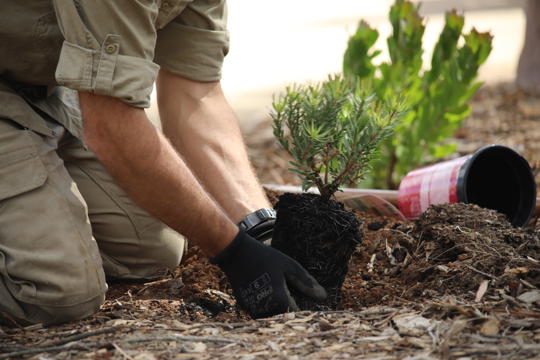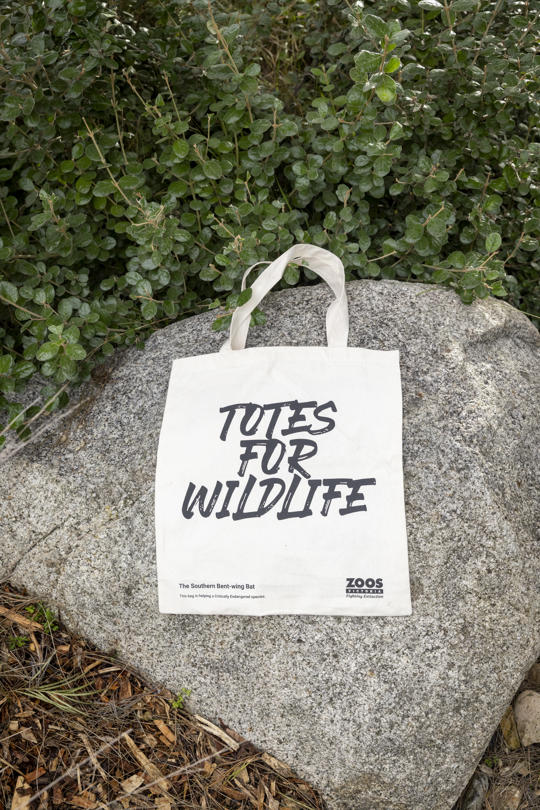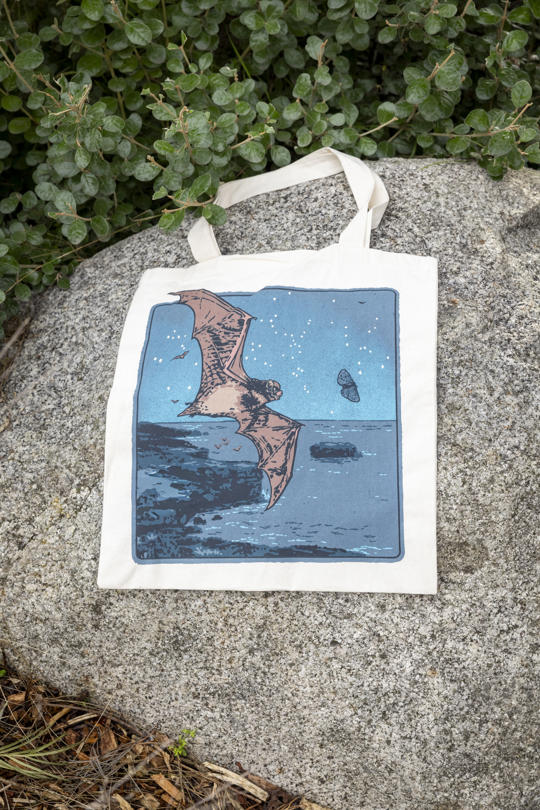Totes for Wildlife
Buy a tote bag and directly support the conservation of local threatened species. With your help, we’ve got conservation in the bag!
Totes for Wildlife highlights a local threatened species each year and, through the sale of exclusively designed tote bags, raises funds for the vital conservation projects we and our partners undertake to protect them.
This year we need your help to support a mighty microbat, the Critically Endangered Southern Bent-wing Bat (Miniopterus orianae bassanii).
A mighty microbat: the Southern Bent-wing Bat
The Southern Bent-wing Bat is a tiny yet mighty microbat, only 5-6cm long and weighing about the same as a 50c piece! Despite its tiny size, the bat can fly incredible distances each night: over 70km in a few hours, and over 150km a night, foraging and moving between caves.
The species is the only Victorian bat that only roosts in caves and lava tunnels (rather than tree hollows), from the coasts of south-west Victoria and south-east South Australia to as far inland as Naracoorte.
They are a very social animal, spending most of their time roosting in caves with thousands of their friends and family, grooming and chatting with each other throughout the day.
There were once hundreds of thousands of Southern Bent-wing Bats, but the population has declined dramatically since the 1960s. In Victoria, the Eastern Maar and Gunditjamara people are the Traditional Owners of Southern Bent-wing Bat Country.

Photo & Header image credit: Steve Bourne

Every Totes for Wildlife bag sold will support Eastern Maar Traditional Owners to care for Southern Bent-wing Bat Country through planting native vegetation.
The Southern Bent-wing Bat persists across highly modified habitats that were largely wetlands and forests before European colonisation. They are threatened by human disturbance of caves, habitat destruction, pesticide use, drought, loss of roosting caves and climate change.
The bats are insectivorous and have a mighty appetite for moths, consuming up to 50-80% of their body weight in insects every night! With less plants and moths available in the landscape, Southern Bent-wing Bats must fly huge distances to find enough to eat.
By providing more native plants to support the bat’s primary food source – moths – we can help work towards a healthy habitat and connected ecosystem for the bat to thrive.
Funding raised by Totes for Wildlife will support Eastern Maar Traditional Owners to care for Southern Bent-wing Bat Country through planting native vegetation that supports moths, near important roosts in south-west Victoria.
By purchasing a Totes for Wildlife bag, you’re helping secure the future of these bats in the wild. With your help, we’ve got conservation in the bag!



You buy a tote,
We plant a tree.
Together we help save a species.
How has Totes for Wildlife helped threatened species so far?
Since 2019, more than 92,000 Totes for Wildlife bags have been purchased, raising money for crucial on-ground conservation projects. :
- 15,000 plants being planted within Yellingbo Nature Conservation Reserve to the east of greater Melbourne to improve and increase available habitat for Helmeted Honeyeaters.
- Over 6,000 Mountain plum pines and other alpine food plants planted in Mountain Pygmy-possum habitat here in alpine Victoria, and habitat improvement works and planting in alpine areas of New South Wales to help the Mountain Pygmy-possum recovery after the Black Summer bushfires.
- 35 Hectares of land protected for the Plains-wanderer through a conservation covenant in northern Victoria to maintain as habitat for this unique bird species, forever.
- Planting of Thousands of Creeping Boobiala plants in the Wimmera region of Victoria, providing important food and habitat for the Golden-rayed Blue butterfly.
Want to do more? Continue to support the Southern Bent-wing Bat by making a tax-deductible donation today.
Zoos Victoria is committed to Fighting Extinction. We work within our zoos and in wild habitats, collaboratively with recovery teams and partner organisations, to ensure the survival of local threatened species.

